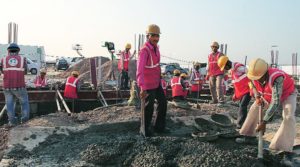Language a barrier to migrants fulfilling their potential – OECD report
A picture of under-utilised skills, discrimination and problems of language acquisition have emerged from one of the first comprehensive studies of the skills of migrants across the globe.
The OECD’s ‘Skills on the Move’ report found that the literacy, numeracy and problem solving skills of foreign-born adults are, on average, lower than those of the native-born i n virtually all countries participating in the survey.
n virtually all countries participating in the survey.
But it also found that skill gaps between migrants and natives vary greatly across countries and different migrant groups.
The report said that largely, these significant cross-country differences are due to migration policies and geopolitical factors determining the composition of the migrant populations and their characteristics across countries.
It points out that migration has been at the centre of the political debate across the OECD in recent years and debates over policies that aim to support and facilitate the integration of migrants have, at times, become deeply polarising
The report says migrants living in the same host country can greatly differ along various dimensions, including skills and educational qualifications but that in most countries’ migrants are a more heterogeneous group than natives.
“For example, migrants tend to have more variable performance in literacy and numeracy compared to natives, not only when considering the population overall, but also when comparing migrants and natives with similar educational qualifications,” the report said.
“Migrants’ skills proficiency varies greatly depending on their level of education, where they acquired this education, their age at arrival, and the duration of stay in the host country,” it said.
An important reason for the difference in literacy, numeracy and problem solving skills observed between migrants and natives is the fact that many migrants are not native language speakers in the country where they live, the study found.
It found the average difference in literacy between foreign-born and native-born individuals was much less when individuals completed the study’s test in their native languages.
Foreign-born individuals whose mother tongue is different from the language of the country where they live also have poorer labour market outcomes, the study found.
“However, the size of the language penalty varies considerably, both across and within countries, as it is related to the degree of proximity between the mother tongue spoken by migrants and the language in which the respondent sat the test,” the report said.
It said that financial and family barriers often prevented migrants from accessing training that might improve their employment prospects.
The report said migrants generally express a higher demand for training programs than natives but have lower participation rates.
The study found that once migrants are able to access training, they spend more time in courses than natives.
Labour market outcomes of migrants are worse than native-born people across the OECD, the report said.
“Migrants are more often unemployed or inactive, and those who are in employment tend to have lower returns to education – in terms of earnings – than their native-born peers,” it said.
“These wage disparities are driven by a plethora of factors. A large part of the difference in the returns to education reflects different patterns in occupational placement, with migrants concentrated in jobs that are associated with a lower socioeconomic status,” the report said.
But, the study found migrants were often paid less than the native-born even when operating in similar roles.
The report authors also looked at non-economic factors affecting integration. They found smaller differences between natives and migrants in non-economic outcomes such as health and happiness.
The report found that in many countries there are no appreciable differences in generalised trust and confidence in the political system, in some countries migrants are considerably less likely to report high levels of generalised trust and political efficacy.
Overall, educational attainment and literacy proficiency were indicators of greater generalised trust and confidence in the political system among both migrants and natives.
On average across OECD countries, native adults were more likely to report having participated in voluntary work, including unpaid work for a charity, political party, trade union or other non-profit organisation in the year before they participated in study.
Around 35 per cent of native adults and 27 per cent of migrant adults reported that they had volunteered in the previous year.
Laurie Nowell
AMES Australia Senior Journalist












